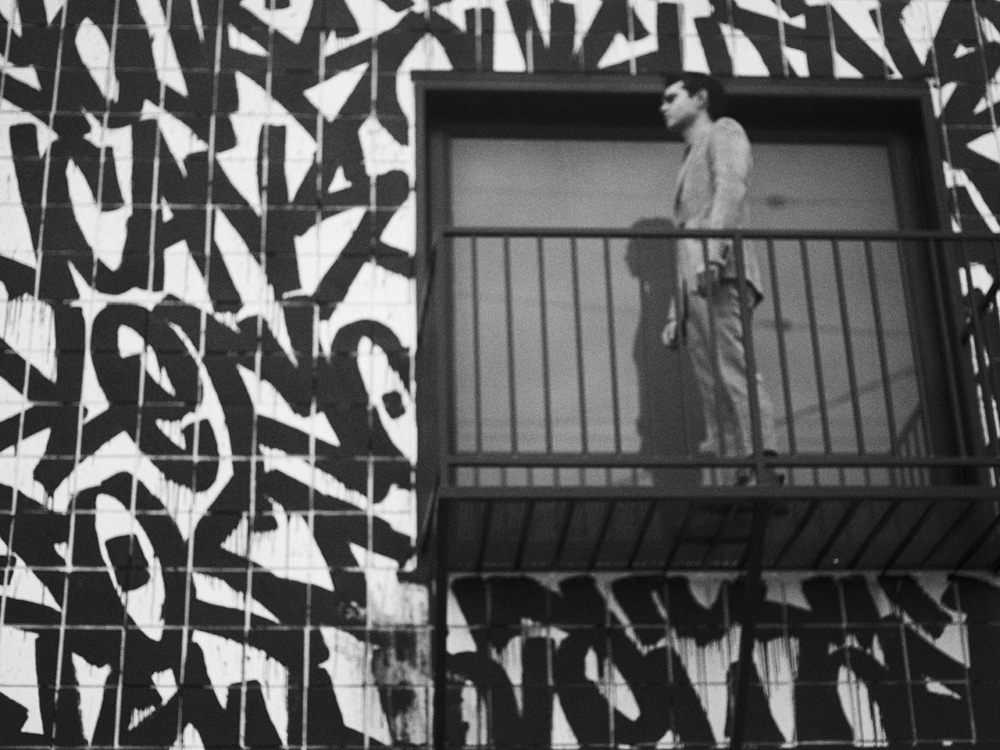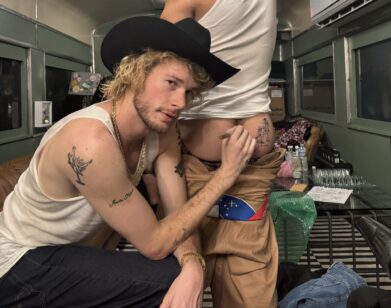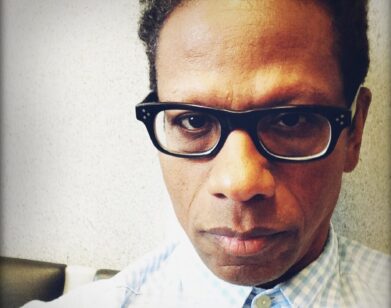Max Minghella
MAX MINGHELLA IN LOS ANGELES, FEBRUARY 2017. PHOTOS: DANI BRUBAKER. STYLING: LEAH ADICOFF. GROOMING: LYDIA F. SELLERS FOR EXCLUSIVE ARTISTS USING COVERFX AND BUMBLE AND BUMBLE.
“This is going to sound wanky,” says Max Minghella over the phone from Los Angeles, “but I really love stories about women. If you go to my Netflix, the sections that they recommend are ‘Thrillers with a Strong Female Lead,’ ‘Comedies With a Strong Female Lead,'” he continues. “I find women more interesting to watch on a lot of levels, and I like the idea of being involved with something I would watch.”
We are discussing Hulu’s adaptation of The Handmaid’s Tale, which, aside from the odd short, marks Minghella’s first project as an actor since Into the Forest (2015). “I took a couple years off acting and was mostly producing for those years,” he explains. “I found I wasn’t very good at it—it’s not a skill set that I possess.”
It was, in part, the quality of The Handmaid’s Tale that lured the 31-year-old North London native back in front of the camera. Based on Margaret Atwood’s alarmingly prescient 1985 novel, the 10-part series takes place in a fictional future America, a totalitarian patriarchy in which every individual is relegated to a specific role. Offred, the show’s narrator played by Elisabeth Moss, is a handmaid—a walking womb assigned to an elite commander and his wife who are unable to have children. Minghella’s character, Nick, is a driver, another low-status member of Offred’s commander’s household. Or at least, that’s what he claims to be. He might be a spy for a group of rebels or, worse yet, a double agent reporting on the commander and his associates. “I feel like he’s true to the Nick in the book, but at the same time, he’s investigated and looked at more thoroughly,” Minghella notes. “It’s Lizzy Moss’s show, 100-percent, but we all have very, very interesting arcs. They gave me a lot of weight and some juicy stuff. I felt like it was one of the more challenging acting things I’ve gotten to do.”
EMMA BROWN: I read that you wanted to be a music video director when you were a teenager.
MAX MINGHELLA: That’s 1000-percent true. I think I still want to be a music director as a grown man.
BROWN: You sort of are now, aren’t you?
MINGHELLA: I’ve done one music video. I don’t know if that makes me a music video director, but it’s a medium that I love. I’m obsessed with the power of music and image together. There’s also something about music videos that are incredibly glamorous—there’s a fetishistic aesthetic to them that you don’t really see in movies in the same way. You get away with indulging imagery, and there’s something very melodramatic about them, which I love. I think a lot of people love music videos, but I think the business model for them is probably quite complicated at this point. When I grew up, there were music videos on television all day and now I have to go on Vevo. [laughs] It’s a different time. But I feel like there’s a bit of a resurgence, which is nice—those Kendrick Lamar videos are great.
BROWN: I also read that you decided you wanted to act after you saw This Is Our Youth in London. Was that the production at the Garrick? Who did you see it with?
MINGHELLA: Yes, it was. I saw every cast. That was the most significant passage of my youth, no pun intended. I think there were four casts in total, and they were all incredibly patient with my fandom. I sort of stalked that play, I would say. Between the ages of 15 and 17 I lived in that theater. I went to as many shows a week as I could. It definitely shaped me as a person, for better or worse. I really became religious about it. I’m still quite religious about it. They just did it again on Broadway and it was a very emotional experience for me to see it again. I don’t think there’s any piece of writing that I’ve engaged with more heavily than that. There’s something quite nostalgic for me hearing any of those words.
BROWN: I remember the production at the Garrick. I was very excited because I was about 14 and Freddie Prinze Jr. was in it at one point.
MINGHELLA: Oh, I remember. Freddie Prinze, Chris Klein…
BROWN: Hayden Christensen, Jake Gyllenhaal. Have you met Kenneth Lonergan?
MINGHELLA: I have. He’s had to endure lots of letters and coat-pulling. [laughs]
BROWN: I know that you’re working on your first feature as a director, Teen Spirit. When did you decide that you wanted to try directing films?
MINGHELLA: It’s something I’ve wanted to do for a really long time, to be honest, and have swung at a couple of times. I probably wasn’t ready in lots of different ways. This movie that I’m about to make feels like the most personal and in my taste of anything I’ve tried to take a shot at. I’m excited that this is going to be the one that I’m getting to make.
BROWN: You wrote the script as well. Was it easier to write after already having written a film, The 9th Life of Louis Drax [2015]?
MINGHELLA: No, this is still really fucking difficult. I’ve been working on it on-and-off for eight years and if you read the script, you would find that very embarrassing. [laughs] It’s quite a tricky thing to pull off, and I don’t feel like I’ve gotten there yet. I hope I will magically before we start shooting principal photography. I think there are some really exciting elements to it, and I’ve been very, very blessed with the people who have come on-board to help me make it, so I’m going to rest on their wisdom and talent and hope it carries us through. It’s going to be an interesting adventure.
BROWN: Was there a moment where you felt, “It’s not done, but I’m ready to show it to people and start the process of making it?”
MINGHELLA: Never! But you also have to remember that if you don’t do that at some point, nothing will ever happen. But, like any writer, it’s kind of awful having to let other people read it. I don’t take pleasure in that at all. I’d love for no one to read the script and just show them the movie, but unfortunately that’s not how it works.
BROWN: Who was your first reader, the first person you gave the script to?
MINGHELLA: I work with Jamie Bell, who is a rock in my life. He’s a great friend and a very patient support, and I don’t think this movie would have gotten to this stage without him being a soundboard and putting up with all my neuroses. He was probably the first person to read it and was a massive influence in shaping the story.
BROWN: Did he give you good critical feedback?
MINGHELLA: Completely. He’s been intrinsic to the creative process on this film in particular. I’ve tried to woo him for other things to help me on, but I think this was the only one he had any interest in. [laughs] But it’s been very helpful and I definitely rely on that. I’m an only child and so I over-rely on my friends to lend their support.
BROWN: Are most of your friends in the film industry?
MINGHELLA: I wish the answer was no, but it’s probably yes.
BROWN: I know you grew up in North London but went to Columbia. What made want to attend university in the States?
MINGHELLA: That was genuinely born from not finishing [high] school. I didn’t finish college [either], but at the time, I hadn’t finished school in England, so I didn’t have the qualifications to go to university in England unless I went back to school. I was 21 at that point, so it would have been slightly eccentric. The most logical way to continue my education was to do it in America and just take the SATs.
BROWN: What made you want to go to university at all?
MINGHELLA: Honestly, probably the guilt of having very academic parents. I think they were slightly ashamed. I’ve always been a terrible student, but they really hoped that I would be better, and I kind of hoped for them. It was, in retrospect, an apology, probably, for being a high school dropout and becoming an actor young and naively. But I’m so grateful for the experience—whatever motive I had to go, it definitely was a great thing. I made key relationships in that time. It also rescued me from a lot of bad career decisions.
BROWN: Did your parents have grand dreams of you being a doctor?
MINGHELLA: I don’t think so. They were fine with me pursuing the things I like; I think they were hoping that I’d be a more well-rounded person, which makes total sense. But I’ve only ever been interested in one thing, and at a certain point, I gave up trying to be interested in other things. We just have to accept who we are and I’m a film nerd, for better or worse.
BROWN: So you took a break and tried producing and screenwriting. What made you want to return to acting?
MINGHELLA: I wasn’t anticipating it at all. It was a script [The Handmaid’s Tale] that was sent to me by a lot of people I trusted. In my life, I’ve made a lot of decisions on my own and have ignored wisdom from other people, and I wanted to change that. When they unanimously felt like this was a good idea, I read it quite seriously and I understood why they were excited about it. It all felt quite organic. I didn’t have to force myself to be excited about it; it was something that I really thought had a lot to say.
In the [first] script, my character, Nick, had maybe one or two lines of dialogue. It was a very small piece of the ensemble. But I was very taken by the writing and I just wanted to be a part of something that felt very substantial and worthwhile, and it turned out that there was more to do with the character as well, which was nice. But ultimately it was about respect and the people involved, who were all very esteemed. I was very grateful that it was something they were willing to give me a shot at. I thought it was really quite a special piece of material. It proved to be even more special once we started making it, so I felt very clever by Episode Five. I was like, “I knew this was going to be good.” [laughs]
BROWN: Do you remember your first time on set?
MINGHELLA: I remember the first thing I did as an actor. I was an extra in Sense and Sensibility [1995], and I got cut from the movie. [laughs] I think I got cut quite a few times as an extra, but that was the most memorable first experience I had because I was very young and excited to do my first part. I was a beggar or something.
BROWN: Did you over-act?
MINGHELLA: I probably wasn’t very good. I probably found some way to fuck it up. I remember when I started acting officially I was unbelievably green. My first audition tapes were just horrendous. I think the first audition I ever did officially was for Pirates of the Caribbean [2003] and the casting director sent the tape to my parents without a note, just to say, “Maybe he’s not cut out for this and you should try and talk him out of it.” I definitely learned on the job.
BROWN: I always wonder, as a young actor, how you balance taking parts that you believe in with getting exposure and doing roles that will lead to other roles.
MINGHELLA: Well, I’ve been absolutely shit at the latter, as you can probably tell from my CV. I’ve never been good at strategy. But I’m not remiss about it. I’ve never taken a job as an actor that I wasn’t 100-percent sure I wanted to do. I’ve never had to think about whether or not I wanted to do something, and there have always been a lot of factors to that. I don’t think I’m an actor who’s driven by character, to be honest. I don’t think I’m like, “Oh, I’m not sure about this story, but I love this role.” That’s never been my process. You look at the quality of the script, the quality of the filmmaker, and then the actors you’re going to be spending time with. Increasingly as I’ve gotten older, I’m much more interested in what the reality of the shoot is going to be versus what the result of the shoot might be. I’m so bad at guessing what’s going to be good and what’s going to be bad—there doesn’t seem to be any correlation between things that are within your control. At this point, I just go, “Will this be fun to make? Will I like going to work? Will I be excited to go to work?”
BROWN: Has being behind the camera—as a producer and when you directed the music video—made you more nervous as an actor?
MINGHELLA: No, not more nervous. One thing it’s been great for is stripping away a lot of my ego. When you have to cast movies from a producer’s standpoint—when you’ve been on the other side of casting sessions—you just get a completely different perspective on what that process is of getting a job for an actor. You realize how completely impersonal it is. If anything, I think it’s made me a lot less sensitive. So much of this is logic and business, and it’s got nothing to do with whether people are good or not. Unfortunately, I think that’s one of the last things that gets factored in when you’re assembling a cast.
THE FIRST THREE EPSIODES OF THE HANDMAID’S TALE COME OUT TODAY, APRIL 26, 2017, ON HULU.







